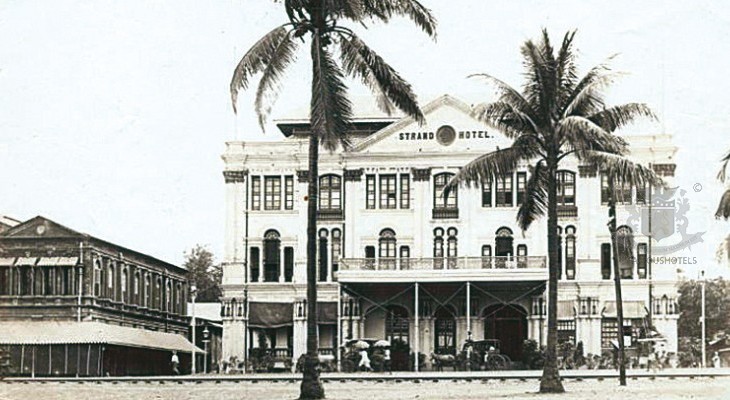
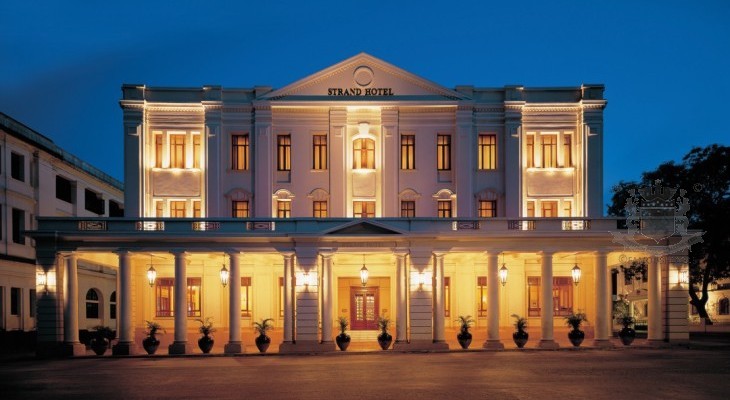
Arrival at The Strand in 1923 and the Bar at The Strand today
Strand Hotel
A book of history, stories and memories. The story of Yangon's most famous hotel, written by teh storyteller of hospitality history. Meet the artists and writers who found inspiration at The Strand. "The Strand" — what a name in South East Asian hotel industry! Talbot Kelly left us wonderful paintings and travel descriptions. George Orwell visited. Somerset Maugham wrote :‘. . . if I could plunge into that enigmatic life and lose myself in it as a cup of water thrown overboard is lost in the Irrawaddy . . . ’
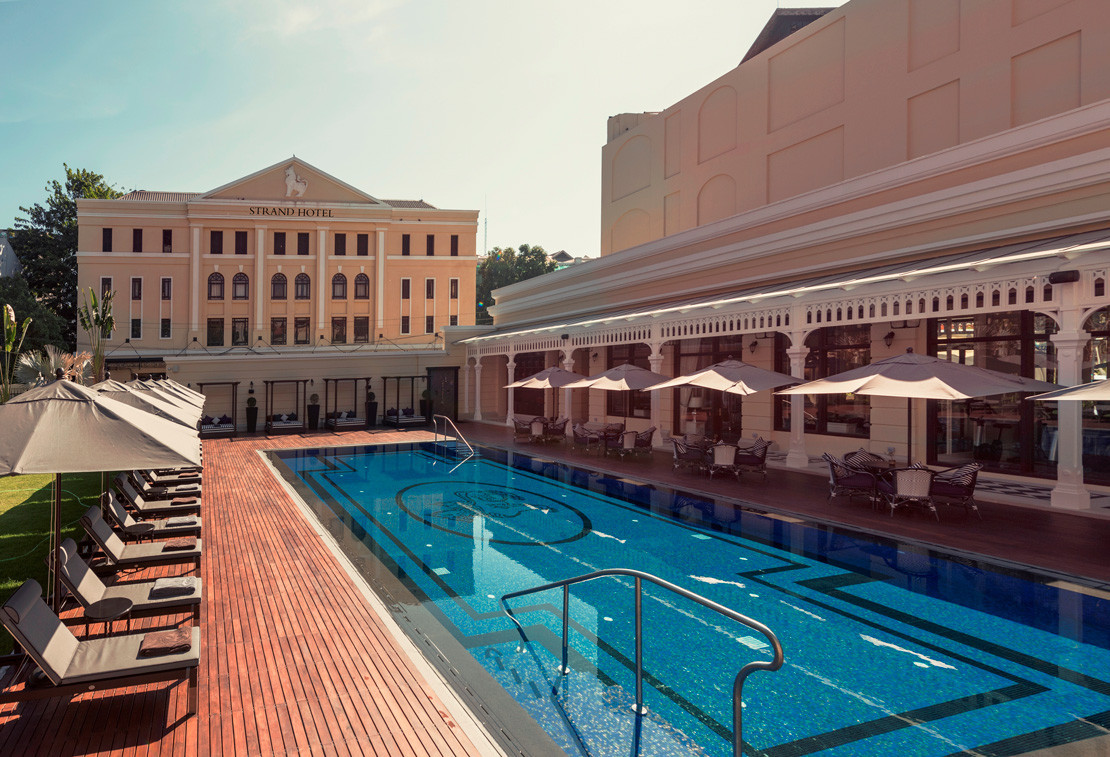
The Strand Hotel's recreation area - an oasis in the heart of the buzzing city of Yangon.
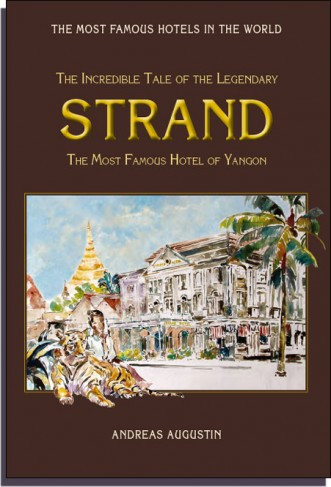 Together with Raffles in Singapore and the E&O in Penang, The Strand has always been considered one of the most British ‘colonial’ hotels of South-East Asia. But in fact it was conceived, built and run by an Armenian family firm: the Sarkies (see Legendary Stories below).
Together with Raffles in Singapore and the E&O in Penang, The Strand has always been considered one of the most British ‘colonial’ hotels of South-East Asia. But in fact it was conceived, built and run by an Armenian family firm: the Sarkies (see Legendary Stories below).
'After an afternoon of sight-seeing, we return to The Strand’s lobby, sipping Myanmar high tea (truly fashionable: the famous Strand bakery supplies basket with pastries, accompanied by gooseberry jam, banana muffins, jam tarts and honeycomb ice-cream for the kids) to the soothing sounds of the harp and xylophone. The kitchen has earned fame, a head butler is in charge of the comfort of all in-house guests. It is an oasis in this demanding world.'
Andreas Augustin
Our new book gives you a deep insight into the hotel's history and life. For more information please visit the links below, including the hotel's history.

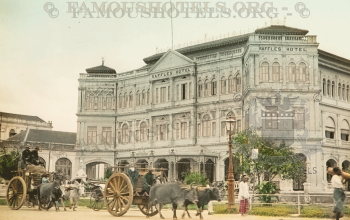
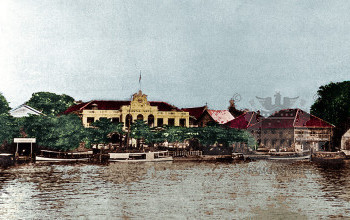
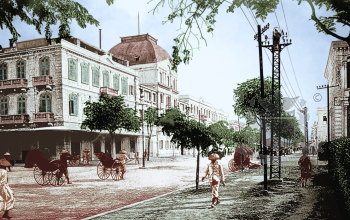
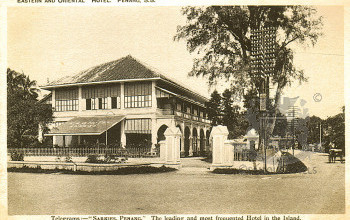
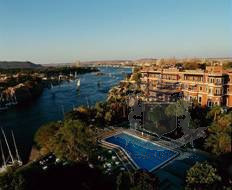
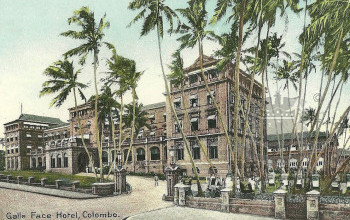

How the Stage was Set
HISTORY IN BRIEF ©famoushotels/Andreas Augustin
1925: The Sarkies sold their hotel to fellow Armenian Peter Bugalar Aratoon.
2007 09 20: Severe unrest shake the country. For the first time in years the theory, that the ruling military junta might crumble, receives serious food again. Demonstrations grew from several hundred people protesting a fuel price rise in mid-August. Emboldened by the presence of monks, huge crowds have joined the demonstrations in protests that reflect years of discontent over economic hardship and political repression. At first, the government held back as the protests grew. It issued its first warning when the religious affairs minister said that the government was prepared to take action against the protesting monks. On 24 September the government announced a dawn-to-dusk curfew (9pm-5am), banned gatherings of more than five people, and placed Yangon and Mandalay under martial law. Troops began taking up positions at strategic locations around Yangon and tried to seal off five of the largest and most active monasteries. Security forces in Yangon, Myanmar, fired warning shots and tear-gas canisters while hauling militant Buddhist monks away in trucks Wednesday as they tried to stop anti-government demonstrations. Myanmar security forces opened fire on Buddhist monks and other pro-democracy demonstrators for the first time Wednesday, killing at least three men and wounding others. Dramatic images of the protests, many transmitted from the secretive Southeast Asian nation by dissidents using cell phones and the Internet, riveted world attention on the escalating faceoff between the junta and its opponents. The Strand's occupancy drops to 2-3 rooms per night.
2008: On 2 May tropical cyclone Nargis hit the coast of Myanmar and devastated large parts of the low-lying Irrawaddy delta. Winds exceeding 190 kilometres per hour ripped through the Myanmar’s biggest city Yangon for more than ten hours. Homes were flattened, more sturdy structures damaged, trees uprooted and power lines downed. In rural parts of the country up to 95 per cent of homes were wiped off the face of the earth. "We have set up a relief fund distributing donations to those in need!" explains Budiman Tanto Widjaja, hotel manager of The Strand. famoushotels.org decided to install an online version of the book THE STRAND TREASURY about the hotel The Strand in Yangon.
2010: Aung San Suu Kyi released: born on 19 June 1945 in Rangoon. In 1991 Aung San Suu Kyi was awarded the Nobel Peace Prize, but could not travel to Oslo to accept it. She was under house arrest in Burma for almost 15 of the 21 years from July 20, 1989 until her release on 13 November 2010.
2011: Regina Salzmann is new general manager of The Strand.
2012: Didier Belmonte is the new general manager.
2013: new (2nd) edition of the book THE STRAND by Andreas Augustin
2017: new 3rd edition of the book THE STRAND
©famoushotels/Andreas Augustin
The Sarkies
Let us focus now on a family of inspired hotelkeepers who developed a new mixture of Asian-European hospitality hitherto unseen in South East Asia. That family was the Sarkies, the founders of the Strand Hotel. As yet, however, they hadn’t got to Burma. The Sarkies had in fact originally hailed from the rugged highlands of Armenia (Armenia: country of Transcaucasia, successor to a historical region in southwestern Asia. Old Armenia extended over what is now the northeastern part of Turkey and the Republic of Armenia. Capital: Yerevan. Area 11,500 square miles (29,800 square km). Pop. (1996 est.) 3,765,000). Their ancestors were traders at Isfahan, in the hills of ancient Persia. For centuries, they plied a lively trade along the Silk Road, dealing in the flow of goods between Europe and the Far East.
By the early 1800s, however, the ancient trading routes that had linked West and East since Roman times began to decline. Moreover, a series of wars waged between the Turks and the Russians over Armenia soured the climate even further. Many Armenians packed their bags and drifted from their homeland to seek their fortunes elsewhere.
Around the beginning of the 1800s, a first wave of migrants moved to the flourishing ports of the Orient, from where the ships of the various East India companies departed daily bound with rich cargo to fulfill the growing demand back in Europe. The members of the Sarkies family were among them. By the 1820s, many of them had reached Singapore and before long two thirds of trading houses there bore the Sarkies name. Others went to Calcutta, Batavia (Jakarta) and Dacca. The branch of the family that interests us landed in Penang.
The Sarkies take South East Asia
1869-1892
1869: An Armenian engineer by the name of Martin Sarkies arrived on the island of Penang. Established back in 1786 by Sir Francis Light, Penang was the first British colony east of Calcutta. That year, the Suez Canal opened. Travelling times between Asia and Europe were halved. Suddenly Bombay, for instance, was 6,274 miles from London and no longer 11,200 round the Cape. And what’s more, the advent of steamships made the voyage even quicker. Some 80% of traffic on the waters was British. Trade in East Asian centres like Penang rapidly thrived.
c.1880: Martin Sarkies’ brothers Arshak, Aviet and Tigran joined him in Penang. Meanwhile, as Penang developed, the lack of decent accomodation for visitors to the island became glaring. The local definition of hospitality tended toward the basic at best. The Penang hotelier offered a room, away from the dirt and dust of the street, safe from rats and straying dogs and beggars or robbers. Nothing existed to rival the opulent hospitality palaces springing up in Europe. This deficiency offered a golden egg to those clever enough to nurture it. The Sarkies would not miss the opportunity.
1884: At Penang, the astute Sarkies brothers established the Eastern Hotel at the Esplanade.
1885: The Sarkies took over the Oriental next door . They merged the two establishments to found the famous Eastern and Oriental Hotel (or the E & O and it is still fondly known today). It quickly proved successful. Too successful, in fact. The landlord raised the rent on the properties and the Sarkies had to look elsewhere.
1887: In Singapore, the Sarkies rented a property at Beach Road on the sea front. There, on 1 December, they opened the legendary Raffles Hotel (initially just a 10-room hostelry). Raffles was a byword for luxurious living and fine dining in Singapore. Tigran Sarkies brought the very first caviar to the colony. With the E & O in Penang and Raffles in Singapore, the Sarkies now ran two hotels in South East Asia. How ironic that the two hotels considered the most ‘British’ in the region were not conceived, built or run by a British company, but by a family of Armenian innkeepers.
1891: Arshak Sarkies, the youngest of the brothers, became manager of the E & O. Buoyed by their success in Penang and Singapore, the Sarkies began scouting for expansion opportunities elsewhere.
1892: Aviet and Tigran Sarkies reached Rangoon. The Sarkies hospitality empire was taking shape.
1994: German Sue Reitz became general manager.
1996: John Reed became general manager of the Strand.
1999: New Zealander Sally Baughen took over the running of the Strand
2003: Martijn van der Valk installed as contemporary assisting resident manager
2003: Sukhdeep Singh
2010: Budiman Tanto Widjaja
2011: Regina Salzmann
2012: Didier Belmonte
2017: Sukhdeep Singh
32 Suites
Every suite is elegantly furnished, abd all bathrooms have bath tub and shower. A personal butler service is provided around the clock.
The Strand Suite
The Strand Grill — The Strand Cafe — The Bar - the great place to meet in Yangon, in particular towards the end of the week.
For a really grand experience, there’s the Strand Suite with a verandah overlooking the river.
From the famous Long Bar, move on to The Café looking into the street, or to the famous Strand Grill with its elegant Bagan prints, chandeliers and glass roof. Afternoon tea is a Yangon institution, or enjoy Burmese music in the Lobby Lounge. The gold and gems market is close to the alleys where talented artists are presented in stall-like galleries. Paintings, jade, pearls, stones, stunning handicrafts; an afternoon time-wrapped at the Shwe Dagon Pagoda; a crossing of the river; a drink here; a dinner there; the Strand’s Colonial Walking Tour; without missing the Strand Lobster and all the other delicatessen of the restaurants. All this after breakfast in bed and an early start, like most Burmese, who are up at six in the morning to exercise in the parks all over the city.
Enjoy a relacing Burmese massage at the hotel.
The ball room across the road is Myanmars oldest venue for great gatherings. Many Burmese have had their weddings their.